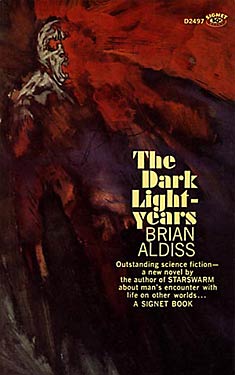Brian Aldiss
Completed 3/6/2018, reviewed 3/6/2018
3 stars
What is civilization?
What is intelligence? Will we
know when we make first contact? These
are the questions that are asked in this book by Brian Aldiss. The earthlings in this book define
civilization as the distance that man has placed between himself and his own
excreta. When first contact is made, it’s
with a race of beings that wallow in dirt and their own excreta. They look like hippos, even though they are
called rhino-men. They have six
appendages with hands with two opposable thumbs. They don’t experience pain. They make sounds out of multiple
orifices. Their spaceship is made out of
wood and is covered in their filth. So,
are they intelligent? Is this
civilization? Or are they lowly animals?
This book makes one pause to reflect on these
questions. The basic plot of this short novel
is that we may not be able to tell when we make first contact because of our
own cultural biases. This may also apply
vice versa. Will aliens recognize us as
intelligent and having civilization?
I liked the plot of the book very much. I didn’t care for the characters, though. The humans, that is. There was no one I was able to identify with
or empathize with. Everyone was too,
well, human. Maybe I’ve just been exposed
to a lot of first contact novels, but it seemed that there was no one who
really understood how to approach contact with alien life. Almost everyone’s approach was shoot first,
try to establish contact later. It
reminded me of the South Park episode where Uncle Jimbo takes the kids hunting
and tells them to shout, “He’s coming right at me”, then shoot, regardless of
what the target was actually doing. But
I think that was the point, to show the inhuman nature of man. Still I would have liked to have seen a
character who would have taken more issue with how they were treating the
aliens.
The best part was when the narrative was told from the aliens’
points of view. The story became very
creative in these parts. I wished there
was more of it, but what we get was enough to understand their behavior and to
realize they were just as confounded by us as we were of them.
One minor complaint I had with the book was that it was very
British. In this, I mean Aldiss used a
lot of British argot which went over my head.
There were occasionally sentences that I had no idea what they
meant. I don’t think I missed anything
of importance, it was just my lack of understanding of certain passages.
Overall, I liked the book.
I give it three stars out of five.
I think I could have given it four stars if there was one character for
whom I had some empathy.

No comments:
Post a Comment